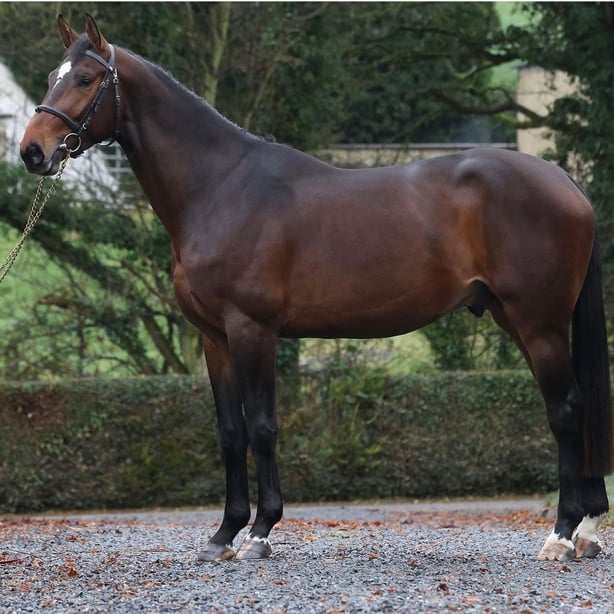A showjumper from Co Monaghan has unveiled a horse that was cloned from the skin cells of a stallion that died a decade ago.
Trotting around his paddock, he's just like any other horse. He’s also like his original, long dead but still alive. Genetically identical.
Pacino II is something of a living paradox. He is a clone, three years old and created from skin cells taken from his original, the stallion known simply as Pacino, who died ten years ago.
Like Pacino II, the original Pacino was owned by showjumper and expert horseman Clem McMahon from Co Monaghan.
"Pacino was my horse of a lifetime and jumped a double clear in the Aga Khan as an eight-year-old. But in January 2013 he took ill and died from kidney failure.
"We knew death was inevitable and I had heard of horses being cloned so we took a good skin sample," said Mr McMahon.
Mr McMahon said they made a couple of attempts at cloning that were unsuccessful.
"Then in 2019 we gave it another go with an Argentinian company and we eventually got a foal in 2020," he said.
Mr McMahon, who owns Hilton Farm near Clones, said they decided to keep the successful birth of Pacino II quiet for a couple of years, but made sure the horse was treated like any other.
"We treat him like a normal horse. He is broken and riding and cantering around on saddle. He has a wonderful temperament and is a carbon copy of Pacino. It's uncanny," he said.
Unlike his original, the plan for Pacino II is not to be a showjumper yet but to go straight to stud, providing semen for AI (artificial insemination), which will be used to impregnate mares.
The original horse that died ten years ago did sire offspring, a number of which went on to showjumping success, including at the highest international level.
Among them is the current number two showjumping horse in the world at the moment, Pacino Amiro ridden by Bertram Allen.

Cloning of high-end and valuable jumping horses has been taking place for some years now and is not as rare as one might imagine.
Back in 2015, it emerged that a top-end stallion, known as Cruising that had died the previous year, was cloned for Kildare-based owner Mary McCann.
In that case, two clones were created, known as Cruising Arish and Cruising Encore, both of which compete in high-level showjumping today.
Horse Sport Ireland, the national governing body for equestrian sport in Ireland, which maintains the Irish Horse Register, allows cloned horses to partake in the sport.
A spokesperson said its rules were changed some years back to allow animals take part, a change that was also adopted by the FEI, the International Federation for Equestrian sports, based in Switzerland.
A different approach is taken with horseracing however. No cloned animals are allowed partake in the sport, which is an accepted international standard for thoroughbred racing.
The idea that animals are being cloned may not sit well with everyone, but since the successful cloning of Dolly the sheep back in 1996, it has become more commonplace.
A number of companies now provide cloning services for many animals, including pets, high-end bulls, horses, and animals on the brink of extinction.
We need your consent to load this rte-player contentWe use rte-player to manage extra content that can set cookies on your device and collect data about your activity. Please review their details and accept them to load the content.Manage Preferences







